Virtue Signaling has become a bit cliché. Still, the term describes a certain kind of public persona. Though the term includes virtue, we all know that when we say someone is virtue-signaling we are criticizing them. If you have virtue you do not signal it. The first and foremost vice is pride. So the virtuous by nature tend not to feel the need to brandish their status as righteous people.
I have assembled this vogue/rogue gallery of the greatest purveyors of gilded righteousness. Let me say, yes, I am a hypocrite and shameless virtue-signaler, which is why I include myself in the top 20! Also, I want to forewarn you that two names will not appear on this list. Mike Wilkinson and Randy Stinson got a lot of attention in the controversy surrounding my firing. I do not want to dwell on their meetings with me. The other names on this list may strike a chord.

#20. Dwight McKissic speaks out quite often on the subject of race. For example, he dove into a feud with the Founders Ministry over their documentary “By What Standard?” Focusing on what he perceives as the racial bias in the documentary, McKissic tweeted the following:
God is exposing the shameful, unjustifiable attitudes toward the 3 Black professors under attack. If they succeed in silencing or removing these men, race relations will return to 1950 in the SBC. I’m encouraged by Danny Akin, Malcolm Yarnell & Keith Whitefield support 4 the 3. https://t.co/2ZTBso73Bm
— Dwight McKissic (@pastordmack) December 17, 2019
I can admire McKissic’s passion for racial justice. His silence on the recent history at Southwestern Baptist baffles me. McKissic is in the same town as Southwestern, pastoring a church not far from campus.
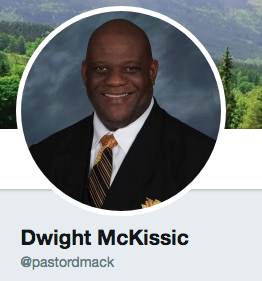 I have not heard if he commented on the racial injustice in Greenway’s firing of 13 minorities and women and Greenway’s decision to replace them with white men tied to Southern Seminary, as Capstone documented here.
I have not heard if he commented on the racial injustice in Greenway’s firing of 13 minorities and women and Greenway’s decision to replace them with white men tied to Southern Seminary, as Capstone documented here.
[Caution: my virtue-signaling about to commence!]
In the year before my firing at Southwestern, I fought very hard to bring more African American voices to the overwhelmingly white environment of Southwestern. I founded a multicultural drama club for which I wrote a play about freed slave Elizabeth Keckley and her friendship with Mary Todd Lincoln. Even against some students’ resistance I devoted two drama meetings to speeches on racial reconciliation. The latter included a visit from George Yancey (who would later be on stage beside J.D. Greear talking about racial reconciliation) and evangelism professor Carl Bradford. The play about Keckley, The Lady and the Girl, premiered on December 6.
In terms of curriculum, I assigned African American texts in a Literary Interpretation class that got canceled against my objections. I included texts about slavery in an Enlightenment section that, when taught by other professors, did not include these texts.
Greenway erased all this black history by firing me on November 29, 2019.
I have a copy of an email from an African American student expressing grievances to Adam Greenway over the lack of support from the seminary for the black history we were trying to present. As far as I know Dwight McKissic had nothing to say about the unfortunate erasure of African American literature and history on campus. Nor, as far as I know, did he have anything to say about the disproportionate impact on minorities of Adam Greenway’s decisions.

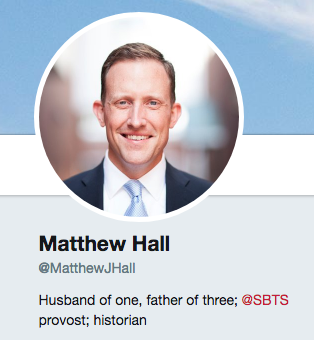 #19. Matthew Hall is the third in a line of controversial provosts serving under Albert Mohler at Southern Baptist Theological Seminary. Mohler hired Russell Moore to serve as provost; Moore left to become the subversive president of the ERLC we all love to talk about.
#19. Matthew Hall is the third in a line of controversial provosts serving under Albert Mohler at Southern Baptist Theological Seminary. Mohler hired Russell Moore to serve as provost; Moore left to become the subversive president of the ERLC we all love to talk about.
Moore was replaced by Randy Stinson, who left the provost’s office at Southern in 2019 to become the provost of Southwestern, where he moved quickly to force gag orders on me and then fire me after telling me the ERLC didn’t like me.
When Stinson left the Southern provost’s office, the third in this ignominious procession was Matthew Hall. Hall took office just as the debate grew hot about “Resolution 9,” the pro-critical-race-theory resolution. A white man devoted to racial discussions, he had stated publicly that he admitted to being a racist because all white people are racist. Once people in the public figured out that these were not statements about himself but rather implicit accusations against all white people everywhere, a backlash ensued.
Mohler assured the public he would never hire anyone who promoted critical race theory onto his faculty. No doubt under pressure Matthew Hall issued a pusillanimous disavowal that convinced nobody of its sincerity. Hall states in one of the SBC’s infamous “let me be clear while I say something that I absolutely do not believe but must say because otherwise I may lose my job” declarations, “But let’s be very clear: Christian witness must reject CRT and the ideological foundations that shape it, along with the proposals it offers for change. In the big picture, it seems to me that CRT assumes a basic materialism, ignoring spiritual realities and, in particular, the truth that human beings are made in the image of God. It also seems to me to have a deficient teleology, one that sees history most basically as a contest between oppressors and the oppressed. ”
Given that Hall’s statements had made clear he felt passionate about a project that most people understood as critical race theory, the rhetorical disavowal simply undermined his credibility.

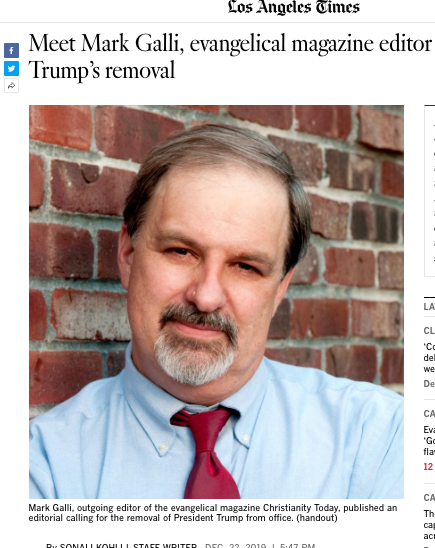 #18 Mark Galli will be editor in chief at Christianity Today until January 2020, when he plans to retire. As a parting gift to his evangelical readers he wrote an editorial calling for Donald Trump to be removed from office.
#18 Mark Galli will be editor in chief at Christianity Today until January 2020, when he plans to retire. As a parting gift to his evangelical readers he wrote an editorial calling for Donald Trump to be removed from office.
Invoking the memory of Christianity Today founder Billy Graham, Galli couched his cri de coeur both in Christian purism and also in Machiavellian pragmatism, claiming that the Christian witness would not be taken seriously if people continued to see evangelicals endorsing Trump.
Galli joins the ranks of NeverTrumpers who forget their intellectual bearings and educational bona fides when Trump’s name comes up. They become ham-fisted and tone-deaf propagandists even worse than a villain from a Sinclair Lewis novel.
#17 Jacob Denhollander commanded a great deal of attention in 2019 because of the issue of sex abuse. His wife, Rachael Denhollander had came forward to testify about the abuse she suffered at the hands of Larry Nassar, a coach who had trained her as a gymnast. Because of this testimony and her advocacy for assault victims, Rachael Denhollander won recognition from Time and Glamour in 2018.
We don’t want to shame victims. We also cannot allow the bad guys to exploit victims as human shields. So let us look carefully.
Jacob Denhollander, her husband, enrolled at Southern Baptist Theological Seminary where he studies under Al Mohler. Mohler had been found complicit with covering up the sex abuses by people tied to Sovereign Grace Ministries, whose leader C.J. Mahaney was a friend of Mohler’s.
Mohler apologized for having helped to cover for C.J. Mahaney, but why was Mohler’s mere apology enough? Given the depth of damage done to sex abuse victims, why did the Denhollanders not ask Mohler to resign as president, especially since all this was happening one year after Paige Patterson was fired from Southwestern for not doing more to bring abuse to light?
Even more disappointingly, however, was the Caring Well Conference which took place under the leadership of the Ethics and Religious Liberty Commission in early October 2019. On September 19, 2019, two weeks before the beginning of the Caring Well Conference, the provost at Southwestern called me into his office and pressured me to resign over my refusal to let his administrators block me from publishing about my experience as a survivor of sex abuse.
The provost who told me to do this was a Senior Fellow of The Ethics and Religious Liberty Commission. And whom did the ERLC platform at the “Caring Well” event? Rachael Denhollander.
Did she notice the erasure of gay abuse victims at this conference? Did this occur to her husband?
The same people adding to her fame and popularity were intimidating same-sex abuse victims into silence. Both she and her husband failed to do due diligence about the organization. Had they looked into the recent history of the ERLC and the SBC, they would have seen that only four months prior to the Caring Well conference, the SBC had blocked a resolution on whistleblowers and sex abuse.
As the resolution had noted, there would be no justice for sex abuse victims in the SBC if people could not come forward and report injustice. Such whistleblowers would never come forward with the gentleman’s agreements, non-disclosure agreements, and retaliation firmly in place in the SBC. Ronan Farrow’s work on Harvey Weinstein had made it undeniable by 2019 that NDAs and retaliation were more integral to perpetuating abuse than the stated politics of public figures—Weinstein vocally advocated for gender equality. Nobody had an excuse to overlook the glaring fact that the SBC had left intact these hideous systems of power even as they tried to present themselves publicly as leading the charge against abuse of the kind R. Denhollander suffered.
The resolution committee sank that resolution right before a huge conference on sex abuse. The conference seemed to focus more on feminism and women’s empowerment and the problems in complementarity, rather than the corruption and self-dealing among entrenched power brokers (like Mohler) which made it possible to hide so many cases.
Plus they threatened to fire me for writing about sex abuse, then made good on the threat less than two months after the Caring Well conference. This is the same retaliatory and silencing structure that the Denhollanders’ allies have used to cover up anything they don’t want people talking about. Sex abuse is one of many crises caused by such a system.
The Denhollanders should have known that they were compromising their important mission by working with the ERLC and Southern Baptist Theological Seminary.

 #16 Robert Downen is a reporter for the Houston Chronicle. As you can see from his profile on Twitter, he has made his career on exposing sex abuse in the Southern Baptist Convention. Yet despite this fame and credit, he somehow missed the fact that the Southern Baptist Convention sank the resolution on sex abuse and whistleblowers just as Downen’s story on sex abuse in the SBC was hotly trending.
#16 Robert Downen is a reporter for the Houston Chronicle. As you can see from his profile on Twitter, he has made his career on exposing sex abuse in the Southern Baptist Convention. Yet despite this fame and credit, he somehow missed the fact that the Southern Baptist Convention sank the resolution on sex abuse and whistleblowers just as Downen’s story on sex abuse in the SBC was hotly trending.
The killing of that resolution will allow untold numbers of abuse cases to stay covered up—and the resolution was killed by the “woke” SBC resolutions committee appointed by JD Greear, not macho wildlife hunters tied to Paige Patterson. Downen also showed no interest in reporting on the new Southwestern firing a full professor for writing about same-sex sex abuse.
This would be like Ronan Farrow just not noticing that Weinstein was using lawyers against his victims.

 #15 Philip Levant serves as the chairman of the board of trustees at Southwestern. He is a Latino Dartmouth graduate and pastors a Spanish-speaking church in the mid-cities of the Dallas-Fort Worth area. When Katie McCoy and Terri Stovall, two female professors, appeared in a negative light in some private correspondence between former Southwestern employees, Levant tweeted, “Any attack on our faculty is an attack on all members of the SWBTS family.”
#15 Philip Levant serves as the chairman of the board of trustees at Southwestern. He is a Latino Dartmouth graduate and pastors a Spanish-speaking church in the mid-cities of the Dallas-Fort Worth area. When Katie McCoy and Terri Stovall, two female professors, appeared in a negative light in some private correspondence between former Southwestern employees, Levant tweeted, “Any attack on our faculty is an attack on all members of the SWBTS family.”
He got a glow from Colleen Flaherty of Inside Higher Ed, for this tweet. (Flaherty will appear on this list momentarily for her own virtue-signaling.) These gestures from Levant leave one wondering whether he tried to counteract the elimination of all but one of the full-time Latino professors that Greenway inherited from the previous administration (as reported by Capstone here).
Levant has not shown other fired minorities the hearty support he showed to Katie McCoy. I am a Spanish-speaking Puerto Rican who had led a mission to Spain and two missions to El Salvador with opportunities for more missions to Central America. With my dismissal all Latino presence in the undergraduate program vanished. For some reason an attack on this faculty member was not, in Levant’s view, an attack on the whole Southwestern community.

 #14 David French became the face of the NeverTrump movement just as evangelical Trump supporters came to hate NeverTrumps. The NeverTrumpers’ largest contradiction was the contrast between their sterling educational pedigrees and the blatant fallacies that plagued their rhetoric.
#14 David French became the face of the NeverTrump movement just as evangelical Trump supporters came to hate NeverTrumps. The NeverTrumpers’ largest contradiction was the contrast between their sterling educational pedigrees and the blatant fallacies that plagued their rhetoric.
For instance, consider what happened when David French went on a crusade against Alabama senatorial candidate Roy Moore. French is famous for his law degree and august educational background. But he used strained appeals such as saying that no due process was necessary in deciding whether Roy Moore was guilty of sexual abuse allegations. French argued as much because Moore was not being tried in a court of law but rather being publicly scrutinized in the lead-up to an election.
The US legal system had due process precisely because we knew that hasty conclusions and overblown accusations were wrong as a general principle, not just as legal procedure. (There is a difference between the rules about voir dire, for instance, and the rules against perjury; false witness is a general human vice as opposed to a procedural impropriety.)
A whirlwind of controversy surrounded French before he left National Review. He often fielded vigorous opposition from conservatives alarmed about his anti-Trump hysteria. The final blow came in 2019 when French ultimately said the drag queen story hours were a symbol of America’s great freedoms.

 #13 Me. I am a sinner, saved by grace. I fall short of the glory of God. I have talked a big game about suffering for Jesus Christ when I fail in my devotion to Him on a weekly basis. While I claim to want to serve God, there are a million ways in which I virtue-signal and only do the outward service while not fully examining or cleaning my heart. I am no better than anyone else on this list. In fact this list is a lot of my own virtue-signaling though I believe it provides important information. I hope the Lord has mercy on me.
#13 Me. I am a sinner, saved by grace. I fall short of the glory of God. I have talked a big game about suffering for Jesus Christ when I fail in my devotion to Him on a weekly basis. While I claim to want to serve God, there are a million ways in which I virtue-signal and only do the outward service while not fully examining or cleaning my heart. I am no better than anyone else on this list. In fact this list is a lot of my own virtue-signaling though I believe it provides important information. I hope the Lord has mercy on me.

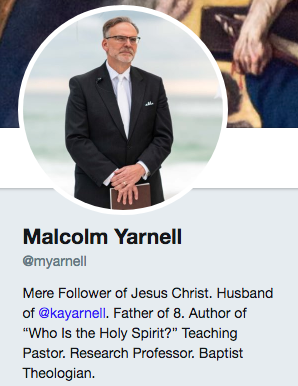 #12 Malcolm Yarnell has never spoken to me. For three and a half years we both worked at Southwestern Baptist.
#12 Malcolm Yarnell has never spoken to me. For three and a half years we both worked at Southwestern Baptist.
Yarnell is a white man. He tweeted at one point that white men should refrain from applying for leadership positions to make way for people of color. He said this on November 16, 2019, when the Southwestern administration was in the process of firing me, an Afro-Caribbean Sino-Malayan veteran who’d been raised by a divorced lesbian. Who’s more intersectional than yours truly?
Yarnell also forcefully defended Katie McCoy, the tweeter at Blonde Orthodoxy, when it was discovered that two people had criticized her in a private letter. He brought a resolution to the entire faculty and pushed through a vote to show her unanimous support.
I know of no move by Yarnell to show support for me or other fired people of color as his bosses fired me for sharing my Christian testimony about sex abuse, gutted the diversity of the faculty in doing so, lied about me in a horrible press release, and then cut off my pay three weeks before Christmas.

 #11 Beth Moore has become a regular fixture in heated Christian debates. Many of the women who endorse her feel that she gets unfairly criticized. I can see their complaints; for example, John MacArthur went too far in telling her to “go home.” But I caution her defenders not to cast her as a helpless hothouse flower.
#11 Beth Moore has become a regular fixture in heated Christian debates. Many of the women who endorse her feel that she gets unfairly criticized. I can see their complaints; for example, John MacArthur went too far in telling her to “go home.” But I caution her defenders not to cast her as a helpless hothouse flower.
She had no problem going after Paige Patterson when the incident had nothing to do with her. She rushes to tweet condemnations before facts come to light. This should have gotten her in trouble in the case of the Coventry kids, whom she seemed to demonize as racists before knowing all the facts.
Her compromises on homosexuality are endangering people. Her complicity with Russell Moore, J.D. Greear, Jonathan Merritt, and others who are degrading the teachings of the church cannot be ignored. Recently she tweeted her support for Mark Galli’s attack on Trump in Christianity Today.
And I have one bone to pick with her about her involvement in the Caring Well conference organized by the ERLC. Just as I stated above with the Denhollanders, Beth Moore did not carry out due diligence about the ERLC’s management of the conference on sex abuse. While my heart goes out to Moore on her story of surviving sex abuse, she contributed to the ERLC’s abuse of the abuse issue.
The ERLC’s conference culminated in more centralization of SBC power and a system where powerful people investigate themselves and their friends. Nobody as established as Beth Moore has an excuse for believing that will help mitigate sex abuse, or for not seeing how the whole issue got exploited.
The resolution on sex abuse and whistleblowers got rejected at the 2019 convention, but it was public record that it was submitted. Without the measures proposed in that resolution, people in the SBC will not be able to come forward to report or discuss sex abuse. The fear of retaliation, non-disclosure agreements, gentleman’s agreements, and the old boys’ network will continue to keep people silenced. While the Caring Well conference dominated the news, the administration at Southwestern was secretly threatening my job if I wrote about same-sex abuse–and they fired me in the end.

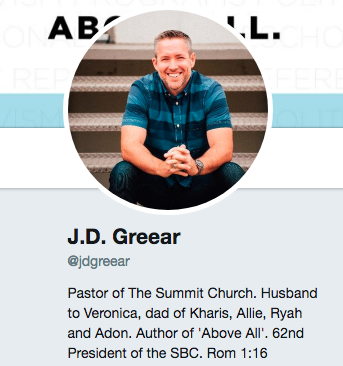 #10 J.D. Greear came into the presidency of the Southern Baptist Convention promising a new face and brighter future for the SBC. At the annual meeting at which he won election, Dallas Police literally threw Tom Littleton out of the convention for asking Russell Moore a question.
#10 J.D. Greear came into the presidency of the Southern Baptist Convention promising a new face and brighter future for the SBC. At the annual meeting at which he won election, Dallas Police literally threw Tom Littleton out of the convention for asking Russell Moore a question.
Upon further investigation it became clear that the ERLC told police to remove Littleton and then lied about having been involved in it when reporters contacted them with questions. Greear should have looked into this and made a statement. He didn’t. Thus began his reign as king of the Old Boys’ Network everyone had expected him to overturn.
Greear has preached consistently on his idea that the Bible does not take sexual sin seriously compared to other sins, a point that flies in the face of much of the Bible. He said at one point that homosexuals he knew were all upset about an “unanswered prayer” that God would change them. This is bizarre because I can’t imagine which homosexuals he has been speaking to; many homosexuals do not say anything of the kind. Also, the entire statement seems to imply that homosexuals can’t do anything to change their behavior and thought life.
So Greear feeds the growing movement in the SBC to stifle ministries designed to help struggling church members get out of the homosexual lifestyle. He encourages the direction toward Revoice. In a piece I wrote in 2018 about the Southern Baptist Convention, I posed the question–would Greear be trustworthy in investigating sexual abuse if his friends were involved?
Greear came to speak at Southwestern’s chapel this fall, at the invitation of the administration that fired me for writing about same-sex abuse. Greear appointed the resolutions committee that sank the resolution on sex abuse and whistleblowers.
#9 Colleen Flaherty and I go back a ways. She writes for Inside Higher Ed, a generally liberal-leaning publication seen as the main alternative to the more buttoned-up Chronicle of Higher Education. In 2015, she wrote an article about my conflicts with California State University over a conference at the Ronald Reagan Presidential Library.
In 2015, she kept referring to my mother as “bisexual” even though I had said my mom was a lesbian. She threw in a statement that my views went supposedly “far beyond” mainstream opposition to gay marriage because of screen shots by gay activists archived on a smear site. The quote she highlighted stated that homosexuality had been closely linked to pederasty. That’s such an obvious historical reality that only someone ignorant of anthropology could be persuaded by gay activists to see that quote as “antigay.”
But that was 2015. In 2019, Flaherty decided to jump into the complex world of Baptist education. She tried to write a piece on my firing from Southwestern. When she contacted me via email, I cautioned her that the Baptist world is a different milieu from the ones she has written about. She didn’t let that memo sink in. So she came out with an article downplaying the racial discrimination, suppression of sex abuse testimonies, infringements on academic freedom, betrayal of the humanities, and abusive employment practices, in favor of the narrative she wanted to regurgitate: I am “antigay” so this was my “just desserts” (her words) for having ever written about sex abuse in the gay community.
Perhaps there exist a few brain-dead gay activists who relish being allied with a patriarchal seminary of a denomination constantly attacked for its proslavery history and abusive labor practices. But I am sure that even many gays who disagree with my views do not want to be “spoken for” by a woman celebrating that I was fired for trying to protect whistleblowers when they came forward to speak about sex abuse. Inside Higher Ed is supposedly going to run my response to Flaherty’s piece in January 2020. We shall see.
I do not know the extent of her communication with the communications office at Southwestern but I suspect she had some off-the-record talk with somebody at the seminary. She may have bought into their off-the-record claims that the seminary is changing to become more liberal, pro-woman, and gay-affirming (things that the seminary would of course deny in public statements).
In the middle of “Antigay and Unemployed” (a title with all the subtlety of a machete), Flaherty veers into a long digression about Paige Patterson’s ultraconvervatism complete with the red-flag quotes from secret email correspondence that got famously leaked by the Southwestern trustees in 2018. This has nothing to do with my case but everything to do with Adam Greenway’s obsessive need to present himself as the antidote to the evil Paige.
I read it and said, “okay, here comes the Greenway sales pitch–Patterson bad Patterson bad Patterson bad–Me no Patterson, Me good Me good.”
Flaherty examined the transcripts of the secretly recorded meetings between me and administrators. In one of the meetings with the provost, the provost admitted that he had taken me to lunch in May 2019 because he was unhappy with a resolution I had submitted to the Southern Baptist Convention. Most people would examine the timeline and see that the provost developed opposition to me because of the resolution I submitted in April 2019, about sex abuse whistleblowers.
But that doesn’t fit Flaherty’s desired narrative, which is that I was fired because, as she said, my “antigay comments caught up with” me. So she claims that the recordings are unclear whether the provost was upset about the May 2018 resolution on ex-gay therapy or the April 2019 resolution on sex abuse whistleblowers. Why would the provost take me to lunch on May 1, 2019, to complain about a resolution from 2018, which would have been submitted before Stinson was even provost at Southwestern–as opposed to a resolution that had been submitted the week prior and had not yet been voted on by the Convention (it would go before the messengers in June 2019)?
Her article suggested that the provost was calling me in to dress me down about “antigay” comments from 2018. This collides with the facts she had at her disposal. A week before her December 11 article, the provost made a public statement on December 4, 2019, explicitly affirming his religious condemnation of homosexuality.

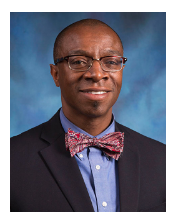 #8 The SBC 2019 Resolutions Committee was appointed by J.D. Greear and led by Southern Baptist Seminary professor Dr. Curtis Woods, the man pictured in the photo above. According to a December 2018 report, he belonged to a “committee conducting research on the history of slavery and racism in the Southern Baptist Theological Seminary.”
#8 The SBC 2019 Resolutions Committee was appointed by J.D. Greear and led by Southern Baptist Seminary professor Dr. Curtis Woods, the man pictured in the photo above. According to a December 2018 report, he belonged to a “committee conducting research on the history of slavery and racism in the Southern Baptist Theological Seminary.”
In December 2018, I was working on an original stage play called The Lady and the Girl, which I planned to launch with the drama club at Southwestern Baptist Theological Seminary, the sister seminary to Southern.
The Lady and the Girl is set in the mid-nineteenth century and tells the long-forgotten story of Elizabeth Keckley, an African American woman who bought her way out of slavery only to become best friends with First Lady Mary Todd Lincoln. The play was a breakthrough in multiracial dialogue on Southwestern’s campus. I went out of my way to invite George Yancey to come speak about racial reconciliation. I asked Dr. Yancey to mention my play to members of the Ethics and Religious Liberty Commission, which Dr. Yancey told me he did.
Yet the resolutions committee did not take kindly to me, according to what Randy Stinson told me. In June 2019, Stinson told me that the resolutions committee had spoken to him negatively about the resolution and me. I do not know if Curtis Woods was the specific individual who spoke to Stinson. His resolutions committee gained much fame by passing the very unpopular Resolution 9 (about critical race theory and intersectionality). Yet his committee was also the one that killed the resolution on sex abuse whistleblowers at the same annual meeting.
A plethora of disturbing questions arises from these events. Why would Curtis Woods’ committee be speaking to people’s employers at all about resolutions that they submitted as an exercise of their rights as Southern Baptists? That the resolution was against gentleman’s agreements, non-disclosure agreements and retaliation raises the stakes here. Why would Dr. Woods’ committee feel it necessary to call my employer to object to a resolution protecting whistleblowers who come forward about sex abuse? Why would they single me out if they care so much about critical race theory and intersectionality, when The Lady and the Girl was arguably the boldest move forward for multiracial curriculum on campus?

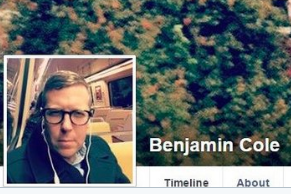 #7 Ben Cole is best known as “the Baptist Blogger.” He played an integral role in leaking audio and memos that helped to damage Paige Patterson’s reputation in anticipation of his 2018 termination.
#7 Ben Cole is best known as “the Baptist Blogger.” He played an integral role in leaking audio and memos that helped to damage Paige Patterson’s reputation in anticipation of his 2018 termination.
One might write off Ben Cole as an attack dog, comparable to David Brock at Media Matters. But Cole tries, at least, to couch his smear campaigns righteously. In November 2019, Cole leaked a 2012 letter from Paige Patterson to Jimmy Draper in which Patterson seemed to express reservations about an African American president of the SBC, Fred Luter. Cole threw this into the social media world along with questions calling attention to Patterson’s ostensible problems with race.
Yet multiple racial ironies undermine Cole here. First, he was doing this as bloggers were finally uncovering the gruesome statistics about how many minorities Greenway actually fired.
Capstone Report obtained the names of the 26 professors fired or demoted by Greenway when he first came in, and published a piece in November 2019, mere days after Cole’s push to smear Patterson as racist. Capstone Report revealed that 13 of the 26 firings were minorities or women. The number of Latino full-time professors seems to have plummeted from five to one.
If the entire purpose behind Cole’s smear was to imply that Patterson was racist about hiring to make Greenway look better by comparison, his storyline has a serious plot hole. Greenway decimated a significant number of minorities that Patterson had hired. Perhaps Greenway did this in a rush so that he could go to the public in January 2020 and announce a “crisis” of no diversity on his faculty, which he could blame on Patterson and then use as justification to hire a bevy of inexpensive assistant professors of color from a coterie of protégés.
If that was Greenway’s plan and Cole was supposed to help him carry out, I suppose I ruined his plan by not signing a non-disclosure agreement the way the other fired minorities may have. His narrative is busted.
As it turns out, in 2015 Cole was forced to resign from a congressional office where he worked. He had filmed African American women without their knowledge and posted the video online with comments comparing them to zoo animals. If Greenway gave Cole access to confidential letters and emails, it would be time for Greenway and Cole to go.

 #6 Rosaria Butterfield has many ardent defenders. Her inclusion on this list is sure to cost me many friendships. But truth will set us free.
#6 Rosaria Butterfield has many ardent defenders. Her inclusion on this list is sure to cost me many friendships. But truth will set us free.
Butterfield has a storyline that has endeared her to many Christian readers, especially those in the Reformed tradition. She was a lesbian women’s studies professor who converted to Christianity and eventually became a stay-at-home mom and pastor’s wife raising children.
But in 2019 we found some warning signs.
The Revoice conference of 2018 had caused enormous controversy and had led many people to view the “same-sex attracted Christian” movement with suspicion. The Revoice participants insisted that they could oppose sexual orientation change efforts but still maintain a traditional Christian sexual ethic. In the end this amounts to pushing “gay Christians” to remain celibate or marry the opposite sex while still identifying as gay or same-sex attracted.
The Revoice position brushes aside the need to change one’s inner thought life and do away with the identity as same-sex-attracted. Karen Swallow Prior endorsed Revoice. The conference gathered together many supporters in 2018 until some critics took a closer look and realized that Revoice was the worst kind of Trojan Horse. To believe in Revoice would mean fusing the gospel with the secular definition of homosexuality as innate and unchangeable.
As more people grew alarmed over the conference and spoke out, the group’s allies worried the movement might destroy careers. A damage control operation kicked into gear.
In early July 2018, Tom Littleton and I submitted an essay opposing Revoice to Public Discourse, a journal edited by Ryan T. Anderson. Anderson rejected my and Littleton’s essay and instead ran a piece co-written by Denny Burk and Rosaria Butterfield. Burk and Butterfield played up the gap between Catholic and Reformed thinking as if Revoice’s major flaw was its ties to Catholicism. Many Revoice supporters were also Reformed though.
Later Butterfield came out against Revoice with nuanced claims that her theology differed from theirs. Butterfield’s solid credentials and strong support from Christian conservatives gave them cover.
Her language became stronger in 2019, as she impressed Reformed thought leaders by stating emphatically that Revoice supporters had a “different religion” entirely from her. The problem is that Butterfield still seems to oppose sexual orientation change efforts. Her view is that homosexuality cannot be changed by deliberate efforts but must be changed by a gift of the Holy Spirit. That sounds good at first. The devil hides in the details. In the ministry this translates into telling people who struggle with homosexuality that they need to pray for deliverance but cannot expect anyone to help them change their orientation.
It also means telling them that homosexual conduct is as sinful as homosexual thoughts, so they need to mortify their desires by feeling really really bad about how sinful they are. But they can’t expect anyone to coach or counsel them to do things deliberately to change, and it would be “heresy” for anyone to presume they could coach or counsel them in such a direction.
After a year and a half of listening to Butterfield’s opaque clarifications, I just don’t buy it. I finally came to the conclusion that if the choice is between two theological positions I find repugnant, and I have to choose between her and Revoice, I’ll choose neither—because both are harmful to Christian ministries but the harm she does is much more carefully camouflaged. Butterfield and Revoice promote the same basic sexual anthropology, with the only difference being that Butterfield ends up trapping strugglers in a far darker place where they can neither get help to change nor make peace with who they are.

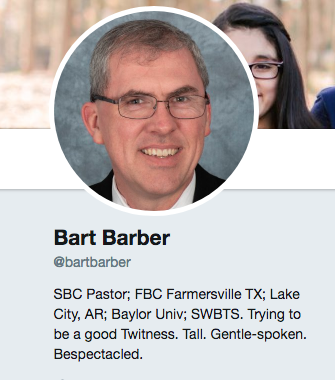 #5 Bart Barber serves on the Southwestern board of trustees. His media profile is one of the more prominent among the trustees. He stood in the forefront during the removal of Paige Patterson, justifying the trustees’ severity by claiming that Patterson behaved in a difficult manner and rejected Barber’s attempts to help him.
#5 Bart Barber serves on the Southwestern board of trustees. His media profile is one of the more prominent among the trustees. He stood in the forefront during the removal of Paige Patterson, justifying the trustees’ severity by claiming that Patterson behaved in a difficult manner and rejected Barber’s attempts to help him.
In the summer of 2018 the trustees were confronted by the public over the surreptitious way they handled Patterson’s firing. A subset of trustees went back on the full board’s initial terms with Patterson. This subset chose to stiffen the reprisal and cut Patterson off immediately. Barber came forward and justified the duress because supposedly Patterson refused to come to a meeting and made public statements without clearing the trustees’ veto process. Knowing what I know now about how Southwestern operates, I can tell they were laying traps and playing a game. Many came forward and applauded Barber.
Later, I came across Barber because of his commentary about sex abuse. He tweeted this concern about the noticeable silence of male victims coming forward:
Statistically speaking, unless there’s some unknown significant factor to explain a wide discrepancy, we should have witnessed a significant number of male victims of sexual abuse coming forward in the SBC. It hasn’t happened.
— Bart the Aged (@bartbarber) November 13, 2019
He tweeted this on November 13, 2019! That was right when his own seminary was in the process of firing me for writing about same-sex abuse. And he was a research fellow on the ERLC when they spoke to the provost Stinson about their concerns regarding my work in the public square.
All this took place after the resolution on sex abuse and whistleblowers was publicly blocked by the SBC. As far as I know, Barber has not commented about the blocked resolution or my firing even with all the information that has come out about the role of my sex abuse testimony in the termination.

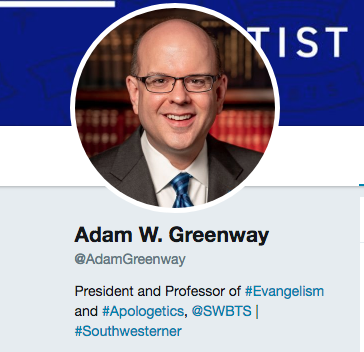 #4 Adam Greenway had to make a cameo on this list. His hiring as Southwestern president came with drama and fanfare. His friends mounted a smear campaign to demonize Paige Patterson over how he handled sex abuse. Based on this pretext, Greenway swept into office, bolstered by a massive media machine claiming he represented a “new day.” He had served as the chairman of the board of Lifeway, a chain that closed all 170 of its retail stores days after Greenway became president. Repeatedly Greenway talked about the four columns of his mission: inerrancy, the Baptist Faith and Message, Great Commission mission work, and the “big tent” of reconciliation.
#4 Adam Greenway had to make a cameo on this list. His hiring as Southwestern president came with drama and fanfare. His friends mounted a smear campaign to demonize Paige Patterson over how he handled sex abuse. Based on this pretext, Greenway swept into office, bolstered by a massive media machine claiming he represented a “new day.” He had served as the chairman of the board of Lifeway, a chain that closed all 170 of its retail stores days after Greenway became president. Repeatedly Greenway talked about the four columns of his mission: inerrancy, the Baptist Faith and Message, Great Commission mission work, and the “big tent” of reconciliation.
[Warning: my virtue-signaling to commence!]
I had a track record of vigorously advancing all four causes. Greenway fired me for sharing my gospel-based Christian witness about sex abuse (pillar 1), in line with the Baptist Faith and Message (pillar 2) thereby striking down the campus’s leader of missions to El Salvador (pillar 3) and main proponent of racial reconciliation and multiculturalism (pillar 4). Not one of the four pillars still stands and he hasn’t been president for a year.

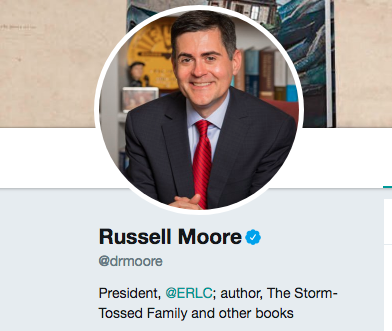 #3 Russell Moore has so many enemies it feels like low-hanging fruit to put him on this list. But he talked a lot of trash against fellow Christians over the immigration issue in 2019.
#3 Russell Moore has so many enemies it feels like low-hanging fruit to put him on this list. But he talked a lot of trash against fellow Christians over the immigration issue in 2019.
As Capstone Report noted about his statements in November 2019, Moore claims the moral ground against mythical straw men. He envisions a ghoulish evangelical racist and presents himself as the virtuous warrior against this exaggerated prototype. Moore said: “An evangelical Christian who despises immigrants is an evangelical Christian who is self-defeating and self-loathing because most of the Body of Christ on earth right now not to mention heaven is not white, is not middle class, is not American, doesn’t speak English.”
Just as a reminder, I am a Spanish-speaking child of immigrants married to an immigrant who promoted multiculturalism at a Southern Baptist seminary. That seminary is run by a provost who also works for Russell Moore as a research fellow. Two months before Russell Moore gave this interview, that provost/ERLC fellow told me that the folks at the ERLC had spoken to him and I had a poor reputation among them, which led the seminary to wonder whether I could work constructively with them. Eventually I got fired. So apparently immigrants are important to Russell Moore except when they’re not—and actually Russell Moore can be just as heartless to immigrant families as anyone else if there’s political hay to make. For more on this individual, watch the SBC Insider program at bobbylopez.me. The first episode was all about Moore’s ERLC.

 #2 Karen Swallow Prior wrote to me on December 2, 2019, to tell me she had heard about how I’d been fired. She said she was praying for my family.
#2 Karen Swallow Prior wrote to me on December 2, 2019, to tell me she had heard about how I’d been fired. She said she was praying for my family.
Prior is a personal case on my list so it is both sensitive and painful. I could cite her public statements about everything from same-sex-attracted Christianity to Trump. But readers probably have Google. Instead I will recount my personal interaction with her a couple of weeks ago.
I had dealt with her several times, and it was a mixed bag of winsome and tense interactions. I can’t say I disliked her but we were on opposite sides much of the time. I wrote back to her, knowing that she had come under criticism from conservatives over her appointment to Southeastern Baptist.
In good faith I asked her if she would make a joint statement with me calling for peace in the SBC. She could have, at that point, shown herself to be bigger than the wrangling and partisan rancor. She was in a position of strength since the SBC was hiring her and firing me.
She answered my email saying no; she wanted to avoid controversy because the criticism over her being hired at Southeastern was “so exhausting.” So basically she would do nothing to stand up for me–or even the general idea that the SBC needed to treat people better.
Because we share common Buffalo roots, I wanted for so long to believe that under Dr. Prior’s exterior, there existed a well-meaning person who wanted to do the right thing. I tried to interpret her behavior through that charitable lens. But there you have it. I had been fired in a political hit job orchestrated by her creepy friends, and she refused to do anything.
Even with people whom you want to think well of, you have to face reality. She has fallen in with a gang of very unsavory people. At some point she became one of the gang and won’t cross them even when they play dirty.

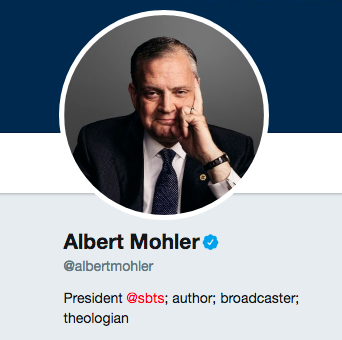 #1 Albert Mohler has been president of the same seminary since the early 1990s. There comes a time in the lives of powerful men when they must realize that they no longer have a heart or mind of their own. The machines they have created now operate as beasts in their independent right, consuming the magnates who engineered them. That’s where Albert Mohler is.
#1 Albert Mohler has been president of the same seminary since the early 1990s. There comes a time in the lives of powerful men when they must realize that they no longer have a heart or mind of their own. The machines they have created now operate as beasts in their independent right, consuming the magnates who engineered them. That’s where Albert Mohler is.
Everyone can find, in Mohler’s vast library of utterances and prognostications, some carefully scripted refrain that seems to flatter their own worldview.
This is how truly powerful men operate. They play to the most promising range of audiences they can find. They invest in their networks of power and their structures of influence. They convince themselves that if they can keep the system going, they can compensate for compromises here and there for a larger vision. This is somewhat like the scene from Oliver Stone’s film Nixon, when Richard Nixon confronts young protesters at the Lincoln Memorial. He tells the youths that he believes the system can be “tamed” to do good. “Sounds like you’re talking about a wild animal” says the young woman confronting him.
Even the leftist Stone could not help but present a sympathetic case for Nixon. He lived at the mercy of corrupt systems he foolishly believed he could control. Anyone looking at Nixon’s life can find something in his actions to repulse them, and other things to agree with. Sometimes the corruption of powers and principalities exceeds even the greatest men’s abilities to subvert them toward some good end.
Mohler is the SBC’s Nixon. He has cut so many deals and talked so much out of both sides of his mouth, it would be impossible to figure out what he really believes. There is no strong case for keeping him in charge of institutions that his tutees have decimated. So many people owe favors to him, not because he was particularly good at things he directed, but because he excelled at holding people under obligations to him. This forced him to owe favors to many others. And the unsettling thing about Mohler is that we will never know whom he owes favors to. He has worked in darkness so long we don’t even know where to turn the lights on.
I reached this conclusion about Albert Mohler when he tweeted out, in early December 2019, that he fully supported the Southwestern leadership. He posted this tweet after it had become painfully public that his protégés in the seminary’s leadership had threatened to fire me if I continued sharing my Christian witness, then had fired me and lied about what they had done. If I had not kept my emails and recordings, I would have never been vindicated against this smear campaign. But Mohler knew this, because the perpetrators were his people. All of this spins like cogs in Mohler’s machine.
Who am I to Mohler? Remember John 11:50: “It is better that one man should die than a whole nation perish.” I am not Jesus Christ. But the verse is a good warning sign and litmus test. If you say the kind of things Caiaphas said it is time to let go and retire. The logic of maintaining power, the reasoning behind compromises, the dances with the devil–they become the snares trapping people in power.






















